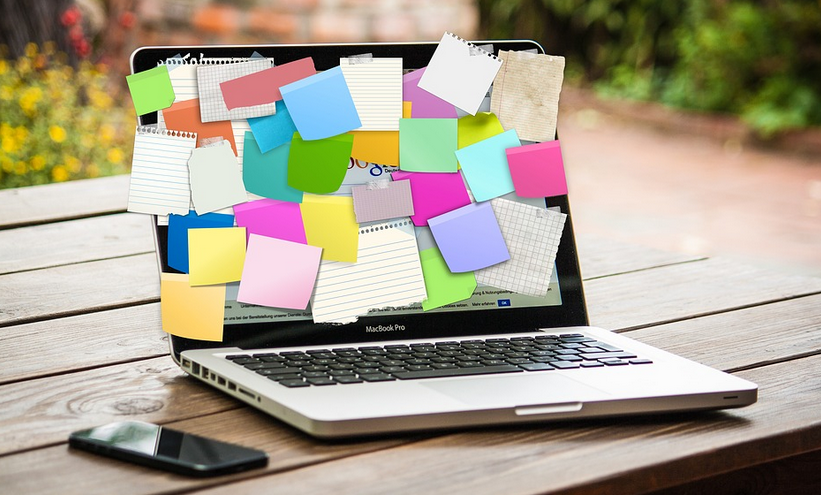Self-management [ATL]
 Self-management is defined as the strategies, techniques, and approaches we use to direct our activities and behaviors effectively. When it comes to school, self-management includes goal setting, planning, and managing your time.
Self-management is defined as the strategies, techniques, and approaches we use to direct our activities and behaviors effectively. When it comes to school, self-management includes goal setting, planning, and managing your time.
Good self-management skills can make a considerable difference to your academic performance by alleviating stress and making you feel that you have considerable control over your own learning.
Organization skills
 Unlike other courses you have taken in high school, in IB courses you are going to be assessed on what you have learned over two years. That means that concepts studied in your first unit may appear on your final IB exam. Being able to find that information efficiently is important for low stress and high success. Organization is the key.
Unlike other courses you have taken in high school, in IB courses you are going to be assessed on what you have learned over two years. That means that concepts studied in your first unit may appear on your final IB exam. Being able to find that information efficiently is important for low stress and high success. Organization is the key.
Although your teacher may suggest ways for you to stay organized over the two years of the course, it is important that you take responsibility for your own learning. You will find on this site that there are many revision materials available for you in the Student Resources. Knowing where these resources are and how they may help you to prepare for exams is an important part of using this site.
Your task
Watch the following presentation. While watching, choose one piece of advice that you think you should follow as you prepare to start your IB journey.
Questions
- What is your Task Manager going to be?
- How do you plan to use a Calendar to help you stay organized?
- What note-taking method are you going to use for psychology? Why have you chosen this method?
- Will you take notes on your computer or on paper? Why did you make this choice?
- How will you organize the papers that you receive during the course? How will you be able to find that important document next April when you start studying for the big exam?
Ways to improve organization
 A new school year or semester is a good time to set goals for improvement. Improving your organization is a holistic goal that could actually help you to improve not only academically, but increase your sense of confidence and lower anxiety.
A new school year or semester is a good time to set goals for improvement. Improving your organization is a holistic goal that could actually help you to improve not only academically, but increase your sense of confidence and lower anxiety.
Here are some tips for improving your organization.
1. Create a digital system for organizing your work
Be sure that there is a "system" to your folders. On your laptop, start with a folder labeled "Psychology." Within that folder be sure to label folders that reflect the different units that you will be doing.
In addition, when naming files, don't call them "homework" or "Essay." This makes it difficult to find files again in the future. Develop a system that you feel you could train someone else to use. If you can clearly explain your system to someone, it is probably a very good system.
2. Create weekly checklists
Mondays are great days to think about what lies ahead. Start your week by mapping out what is due this week, making note of any major commitments you may have. When we do this, we sometimes realize that your doctor's appointment is the day of your in-class Psychology Paper 1.
Creating a checklist of what we hope to finish by Friday helps to increase our awareness of what we have to do during the week, but it also can give us that wonderful feeling of accomplishment as we slowly but cross those items off the list!
3. Prioritize your assignments
Not all assignments are equal. When creating our weekly plan, think about what should be done first. Prioritizing assignments can be based on deadlines. If something is due tomorrow at 8:00 and is a significant part of the semester grade, then this may be an obvious priority.
But if you have four smaller assignments to do, then making a conscious choice of which one to do first makes a big difference. There are at least two strategies. You could decide to do the easiest assignments first. This always feels good. But it does leave us with the more difficult tasks when we are already a bit tired.
Starting with the most challenging and least interesting task can be a good strategy - saving your favorite class or most exciting project to work on last. This can be a motivator to get us through the work that we are not excited about doing, but it also may help us to limit the time that we spend on that exciting project...
4. Set time limits for your assignments and assessments
Sometimes when we are doing a project that we love, we can "go down the rabbit hole." In other words, we can spend a ridiculous amount of time reading and following links. Although this may be enjoyable, it is definitely not the best use of our time when we have other assignments that need to be finished.
Another time killer is perfectionism. Remember, spending four hours on a take-home Paper 3 does not allow you to get good feedback from your teacher about how well you would don on this hour exam. Setting time limits for yourself will help you to use your time more effectively.
5. Less is more
Some of my students have surprised me in the past with study guides that were longer than the textbook chapter on Inthinking! Remember, your goal of the course is not to design the "ultimate study guide!" Instead, you should be keeping track of what you still need to learn. By the time you get to your May exams, your study guide should be pretty short. You should remove materials from your study guide that you have already learned, leaving only a short list of those last concepts that you struggle with.
6. Clean up your workspace
And finally, an important part of organization is to remove clutter. Get rid of files that you don't need. Don't keep everything, only the materials that will best help you to prepare for your exams.
Affective skills
 However good you are at organizing your time you still need the motivation to actually complete assignments in the allotted period. Affective skills address this and include resilience and self-motivation. External factors such as problems with a friend or long-term illness can obviously affect your ability to concentrate but in more normal circumstances you can develop strategies to improve your affective skills.
However good you are at organizing your time you still need the motivation to actually complete assignments in the allotted period. Affective skills address this and include resilience and self-motivation. External factors such as problems with a friend or long-term illness can obviously affect your ability to concentrate but in more normal circumstances you can develop strategies to improve your affective skills.
Resilience
A friend of mine defines resilience as bouncebackability - that is, the ability to recover from a setback. For you to be successful both at school and later in life you need to be able to learn from your mistakes. You should not be afraid to fail - but instead, see failure as part of your learning journey. Learn to move out of your comfort zone and reflect on both your positive and negative experiences when you do so.
Sometimes we need help to bounceback from failure. An important part of resilience is agency - that is, your ability to seek out assistance when you need it. For example, talk to a friend, parent, counselor, teacher, or advisor when you feel a bit overwhelmed and need some guidance. When you feel bad about a school experience, it is best to address those feelings sooner rather than later.
Self-motivation is an important part of resilience. You should think about why your classes are important for you - and not why it is important for your parents or teachers. Finding the value in what you are doing is a key part of self-motivation.
Mindfulness
One of the important aspects of resilience is managing our stress and anxiety. All of us experience stress and anxiety from time to time. How we respond to those feelings is important. Some people go for run. Others take "time out" from school and hang out with friends. Mindfulness is one of the ways that you can regulate stress. Many students begin their day with a 10-minute mindfulness exercise. Others will find a quiet space for mindfulness before sitting an exam - rather than engaging in the last minute panic with their classmates.
Here is a good example of a 10-minute meditation.
Reflection as a skill
 The questions you are asked in class and the questions that you can access from this site can all help you reflect on your learning. Reflection does not have to be a deep, spiritual experience (although it can be!), but instead it should be part of your learning process.
The questions you are asked in class and the questions that you can access from this site can all help you reflect on your learning. Reflection does not have to be a deep, spiritual experience (although it can be!), but instead it should be part of your learning process.
Reflecting also does not always need to be in writing. Often, some of the best reflections happen only inside our heads. However, it is important to reflect intentionally with the goal of improving our learning and performance.
Questions for reflection
- What am I excited about and/or worried about in this next unit?
- When working through personalized learning on this site, why did I get some of the questions wrong? What did I not understand that led to these mistakes?
- How could I have done this last assessment more efficiently and still maintained my high level of performance?
- What did I learn today that has value for me as a person, not just as preparation for IB exams?
- How has my thinking changed? What did I used to think and what do I think now?
- How might I use today's learning in psychology and apply it in my own life? In my other classes?
- How could I apply something that I have learned to improve our community?

